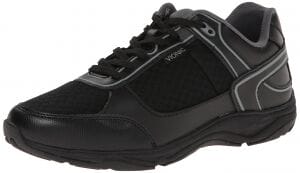Plantar Fasciitis Shoes and Footwear Choices
What are plantar fasciitis shoes?
There are a number of shoes on the market that claim to be plantar fasciitis shoes. In simple terms, these are types of orthopedic shoes that claim to be an effective method of naturally realigning the foot and alleviating heel pain associated with plantar fasciitis. At present, there is no credible scientific evidence relating to the effectiveness of plantar fasciitis shoes.
What is plantar fasciitis?
Plantar fasciitis is an inflammatory condition that affects the plantar fascia ligament. This ligament runs along the bottom of the foot, connecting the base of the heel bone to the base of the toes. When this ligament develops micro-tears due to overuse or injury, plantar fasciitis develops, causing heel pain. A classic hallmark of plantar fasciitis is the sharp and stabbing pain that sufferers experience in the centre of the base of their heel, first thing in the morning as they get up out of bed. But can plantar fasciitis shoes help?
What causes plantar fasciitis?
Plantar fasciitis can be caused by a many number of contributing factors. Most commonly, it is caused by overuse, or repetitive strain to the plantar fascia ligament. This type of strain can occur with excessive or sudden increase in running or walking or repetitive jumping. There are certain risk factors that can increase a person’s chances of developing plantar fasciitis, and these include:
- Age: plantar fasciitis risk increases with age
- Foot biomechanics: flat feet (pes planus), high arches (pes cavus) or suboptimal gait (walking pattern) can put extra pressure on the plantar fascia when walking or standing
- Tight calf muscles: having poor flexibility in your calf muscles places extra pressure on the plantar fascia
- Overweight and obesity: extra body weight puts extra pressure on the structures of the feet and ankles, including the plantar fascia, increasing the risk of plantar fasciitis
- Footwear: flat or unsupportive footwear can contribute to the development of plantar fasciitis
- Occupation: jobs that require a person to be on their feet for extended periods on hard surfaces (such as factory workers) increase a person’s risk of plantar fasciitis due to injury of the plantar fascia ligament.
Are plantar fasciitis shoes necessary?
Given that there is currently no peer-reviewed scientific evidence to support the efficacy of any specific type of plantar fasciitis shoes, the short answer is no, they are not necessary. Some types of plantar fasciitis shoes claim to provide support to the feet, however there are other forms of support that can be very beneficial in providing control and stability for the foot. Your sports podiatrist can advise you as to which types of support are most appropriate for you. These may include strapping techniques, prescription/custom-made orthotic inserts, or in some cases, immobilization boots.

What types of plantar fasciitis shoes are there?
Whilst there is no one type of most appropriate plantar fasciitis shoes, there are some types of shoe that you should avoid if you already have plantar fasciitis, or in order to prevent the development of the condition. You should avoid wearing shoes that provide little or no support to the feet for prolonged periods of time. Some examples of such shoes include ballet flats and regular flat-soled flip-flops or thongs. These types of shoes don’t provide any arch or heal support for your foot, and in the case of flip-flops, your toes are constantly trying to grip to keep them on. In the long term this can lead to several issues in the feet, including strain of the plantar fascia.
Your sports podiatrist can assist you in selecting footwear that offers high levels of support to the heels, soles and arches of your feet. Functional running shoes are often suggested as a footwear option for people who have plantar fasciitis, since they provide arch support, however these can be quite costly, so it is always best to consult with your sports podiatrist as to which brands or makes of shoe might be appropriate for your foot. There are a number of options in footwear brands nowadays, from sandals to working shoes, which are better choices than flat-soled, unsupportive shoes.
Please note that the information regarding plantar fasciitis shoes and footwear choices mentioned above, is for educational purposes only and should not be taken as general medical advice. If you are suffering with plantar fasciitis or wish to discuss plantar fasciitis shoes or footwear choices, you should make an appointment with a sports podiatrist. Appointments can be made online Here or by phoning (02) 93883322.
Written by Karl Lockett



